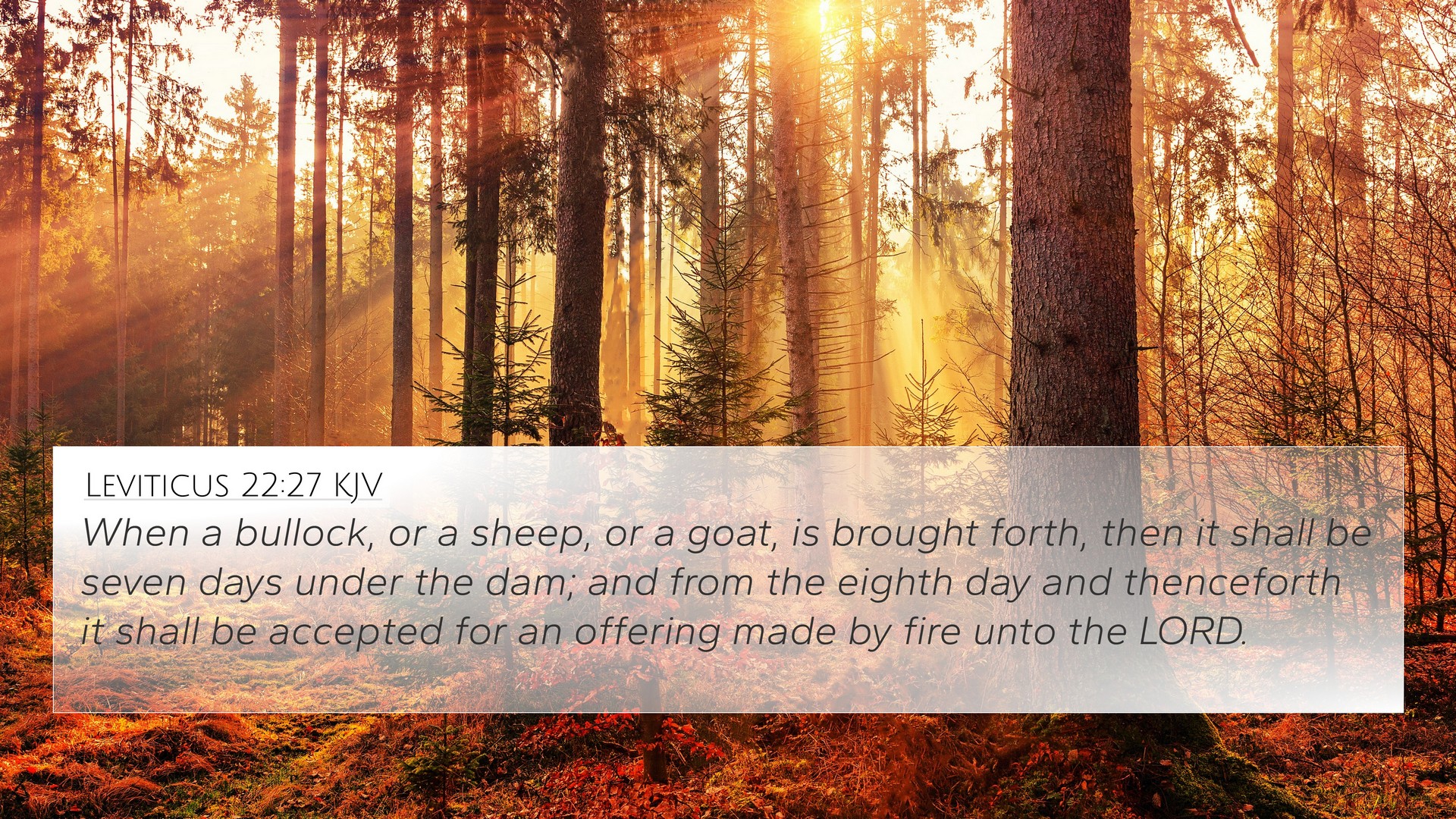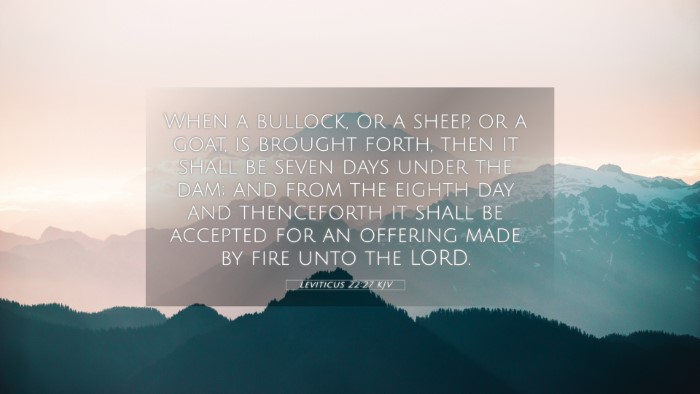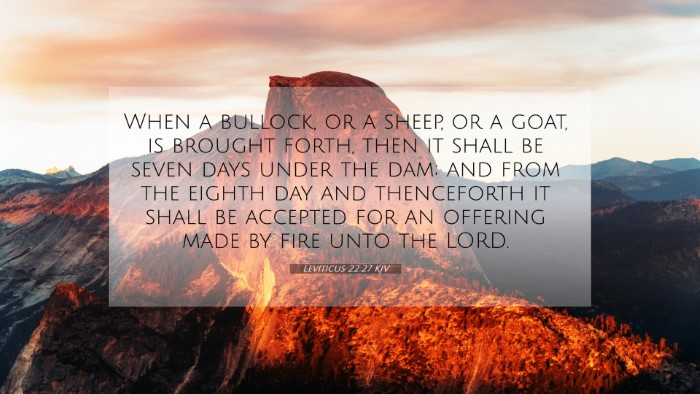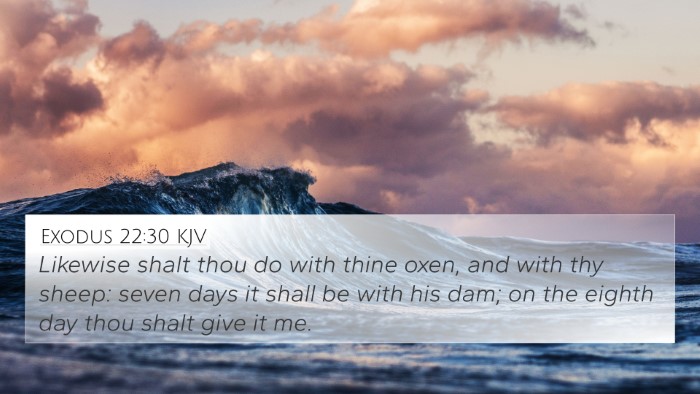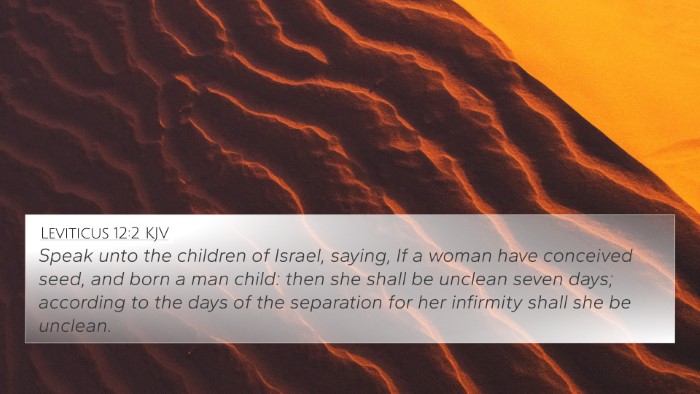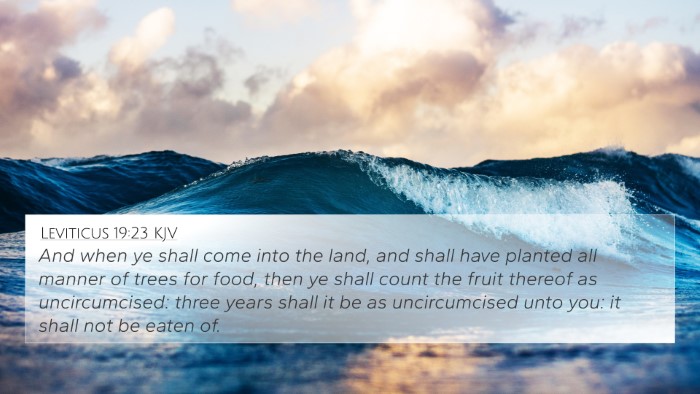Understanding Leviticus 22:27
Leviticus 22:27 states: "When a bull or a sheep or a goat is born, it shall be seven days with its mother, and from the eighth day on it shall be accepted as an offering by fire to the Lord." This verse provides insights into the ceremonial laws regarding offerings and the training of the Israelites in sacred practices. Here, we will explore its meaning through the lenses of public domain commentaries by Matthew Henry, Albert Barnes, and Adam Clarke.
Commentary Insights
Matthew Henry's Commentary
Matthew Henry emphasizes the significance of the timing for offering animals to God. He notes that the command to wait seven days before offering reflects God's concern for the natural development of the animal, demonstrating His mercy even in sacrificial requirements. This practice underscores the balance of reverence and care for creation, reminding Israel of their role as stewards.
Albert Barnes' Commentary
Albert Barnes discusses the implications of offering livestock after a week. He argues that this stipulation signifies the need for completeness and readiness, ensuring that an animal is mature enough to be sacrificed. Sacrifices must not be rushed, symbolizing a thoughtful approach to worship, thereby assuring that the offering reflects both quality and intention.
Adam Clarke's Commentary
Adam Clarke notes the importance of animal welfare ingrained in this law. He suggests that these regulations about the birth and age of the animals prioritize the life cycle of the creatures involved, which aligns with God’s nature as a compassionate creator. Clarke further connects this to the notion of holiness, as the offerings must come from well-cared for, healthy animals, resonating with the idea of presentable worship.
Connections with Other Bible Verses
Leviticus 22:27 finds deeper richness when explored alongside other scripture. Below, we outline several related Bible cross-references that provide a broader context and understanding:
- Exodus 22:30: "You shall be consecrated to Me. Therefore, you shall not eat any meat that is torn by beasts in the field; you shall throw it to the dogs." - Highlights the concept of consecration and offering.
- Deuteronomy 15:19-20: "All the firstborn males that are born of your herd and of your flock you shall sanctify to the LORD your God." - Emphasizes the sanctification of offerings.
- Numbers 18:17: "But the firstborn of a cow, the firstborn of a sheep, or the firstborn of a goat you shall not redeem; they are holy." - Relates to the sanctity of firstborn animals.
- 1 Peter 1:19: "But with the precious blood of Christ, as of a lamb without blemish and without spot." - Connects to the significance of pure sacrifices, paralleling with the New Testament's understanding of sacrifice.
- Hebrews 9:14: "How much more shall the blood of Christ, who through the eternal Spirit offered Himself without spot to God..." - Indicates the transition to Christ as the ultimate sacrifice.
- Psalm 51:17: "The sacrifices of God are a broken spirit; a broken and contrite heart..." - Explores the essence of what true offerings signify.
- Isaiah 1:11: "To what purpose is the multitude of your sacrifices to Me?" - God questions the motives behind offerings, correlating with the emphasis on intention in sacrifices.
Thematic Analysis
The legislation in Leviticus 22:27 has profound themes including:
- Divine Order: The verse exemplifies God's order in worship practices and the rhythm of life.
- Covenant Relationships: Highlights the relationship between God and Israel, emphasizing obedience to His decrees.
- Worship and Sacrifice: Underlines the training of the community in rituals that honor God, ensuring proper practices in their covenantal relationship.
- Compassion in Offerings: Promotes the idea that God is mindful of His creatures even in sacrificial contexts.
Application of Cross-Referencing Tools
Discovering meaningful Bible verse connections can enhance your study and understanding of biblical texts. Utilizing tools for Bible cross-referencing—such as concordances and Bible reference resources—can greatly assist in uncovering these thematic links. Here are some tips:
- Use a Bible Concordance: This can help you identify words and themes throughout Scripture.
- Look for Parallel Verses: Many Bible translations indicate parallel verses that share similar themes.
- Engage in Comparative Bible Studies: This approach allows you to find connections across different books of the Bible, especially between the Old and New Testaments.
- Utilize Online Cross-reference Tools: Many websites and applications offer easy access to cross-referenced scriptures.
- Study in Context: Always read verses within the chapters to understand their full meaning.
Conclusion
Leviticus 22:27 offers a snapshot into God's requirements for sacrifices while showcasing His compassionate nature and the importance of intention in worship. This verse is interwoven with significant themes and biblical connections that enrich understanding and engagement with the text. By studying cross-references and employing various Bible study tools, believers can gain deeper insights into their faith journey and the unity of Scripture.
